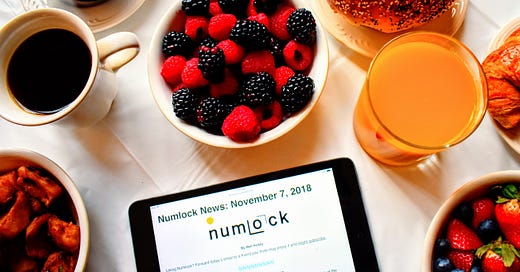Numlock News: July 21, 2022 • Quidditch, The Blob, Latin
By Walt Hickey
Quadball
Seeking to turn the corner as a legitimate sport and vaguely ashamed at the direction the inventor of the game has taken, U.S. Quidditch, Major League Quidditch and soon the International Quidditch Association will rebrand their sport as “quadball.” The names of the positions and balls will remain the same for the time being, as will the rules, but this does move them slightly out from under the shadow of the full might of the Warner Brothers corporation, which does own the copyright on the word “quidditch.” The sport was first played at Middlebury College in Vermont in 2005 taking inspiration from the game in the Harry Potter books, and is now played in 40 countries with 600 teams in existence. The IQA European Games are this weekend, if you happen to somehow have access to a cable television sports package that cost thousands of dollars a month and offers hundreds of ESPNs such that one might bother airing Quidditch.
Music
The overall market for music last year was up 9.3 percent, which is interesting inasmuch as we can figure out which genres are comparatively exploding at a far faster rate. The two biggest winners: Latin music grew at an annual rate of 28.4 percent, the second consecutive year of more than 20 percent growth, and world music — defined as a catchall category for any non-Latin music from outside the U.S., such as Afrobeats and K-pop — was up 26.4 percent annually. Latin music is now 6.25 percent of the total market, and is vying for the fourth place among music genres, a place currently held by country music which has 7.83 percent of the market. The thing is, the net difference between the Latin and country market shares fell from about 3 percentage points to 1.5 percentage points, with country shedding share and Latin gaining it.
Telescope
Results are in, and after like three pictures the American people are pretty sold on the new James Webb Space Telescope. A new survey conducted in mid-July found that 60 percent of Americans consider the JWST a somewhat or very good investment, with 26 percent unsure and just 13 percent thinking the instrument was a somewhat or very bad one. That’s pretty solid performance after just a couple of days of good press, a couple photos and 10 billion dollars. The polling still slightly lags that of the longtime workhorse Hubble, which 70 percent consider a good investment and just 13 percent think was a bad bet, revealing that there is a core of 13 percent of Americans who just pretty much unilaterally oppose telescopes.
College of Cardinals
Pope Francis has significantly overhauled the College of Cardinals that will eventually vote on his successor, and the biggest shift has been ceding power that had long been consolidated among European cardinals and distributing it to the places that have rising amounts of Catholics. As of 2010, 24 percent of Catholics lived in Europe, but the region had 52 percent of the Cardinals as of the start of Francis’ papacy in 2013. Today, that’s down to 40 percent, still disproportionate but closer to parity. Francis increased the percentage of Cardinals representing Asia-Pacific from 9 percent to 17 percent, a bit high given that the region makes up 12 percent of Catholics. Meanwhile, representation among Cardinals from Latin America and Sub-Saharan Africa still lags substantially, as those areas are home to 55 percent of Catholics but just 30 percent of Cardinals, up only 5 percentage points from 2013.
Jeff Diamant, Pew Research Center
The Blob
Marine researchers are still making sense of the devastating oceanic heatwave that hit the northeast Pacific Ocean from 2013 to 2016, an event known as the Blob. Kelp forests were particularly affected — kelp disappeared from 40 percent of the surveyed sites — but the specific manner in which those kelp forests were affected varied site-to-site based on a number of different factors, illustrating just how unpredictable the effects of heat can be on an ecosystem. For instance, kelp closer to a warm bay died more than kelp closer to cooler ocean. But still plenty of kelp near the bay survived, and the reason is that the warm water wasn’t just directly killing kelp, it was indirectly doing so by killing sea stars and fueling the rise of enormous swarms of sea urchins who devoured the kelp, and the kelp that survived did so because they managed to dodge an urchin onslaught by living in the sandy areas that urchins hate. Anyway, global climate change is going to be devastating in weird ways we can only imagine.
Drivers
The United States has a shortage of transit drivers, with a survey of 117 transit agencies finding 71 percent have had to cut service or delay service increased because of a lack of workers. The transit workforce is a decade older than the workforce as a whole, with the average operator aged 53. The tight labor market isn’t helping, nor are the lower starting salaries for new workers. The starting hourly salary for operators at the seven largest U.S. transit regions ranges from $19.55 an hour in Philly’s SEPTA system to $29.61 an hour in San Francisco’s SFMTA, but the real issue is the rising cost of living in those same cities that may prevent workers from actually living in the cities in which they drive at those salaries.
Goods
In Indonesia, one of the most booming sectors in e-commerce is apparel that has been vetted to be Shariah-compliant. As the fourth-largest country in the world, and with a Muslim-majority population, there’s a massive market for garments that meet the halal standard, which ensures that it doesn’t include pig products or alcohol and hasn’t at any point been stored with non-halal goods. The overall market for Shariah-compliant goods in Indonesia is estimated to be $114 billion according to the Global Islamic Economy Indicator, and the e-commerce market for halal products was estimated by the central bank to be $170 million in 2021; as a result a number of startups and brands have launched in the country to meet that unique need.
Antonia Timmerman, Rest of World
Thanks to the paid subscribers to Numlock News who make this possible. Subscribers guarantee this stays ad-free, and get a special Sunday edition. Consider becoming a full subscriber today.
The best way to reach new readers is word of mouth. If you click THIS LINK in your inbox, it’ll create an easy-to-send pre-written email you can just fire off to some friends.
Send links to me on Twitter at @WaltHickey or email me with numbers, tips, or feedback at walt@numlock.news. Send corrections or typos to the copy desk at copy@numlock.news.
Check out the Numlock Book Club and Numlock award season supplement.
2022 Sunday subscriber editions: Twitter Friction · Fangirls · Air Quality · Non-Colonial AI · The Reckoning · Hippos · Fixing Baseball · Booze Trials ·















